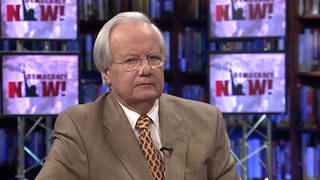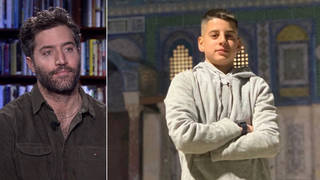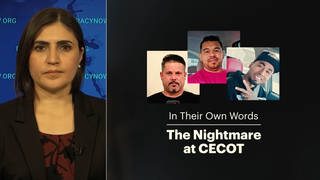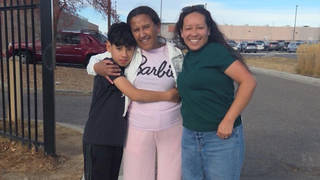
Kilmar Abrego Garcia, who became a symbol of Trump’s anti-immigrant crackdown when the administration illegally sent him to El Salvador earlier this year, is at risk of being deported again — this time to Uganda, a country he has no ties to.
Abrego Garcia was one of hundreds of men sent to El Salvador in March to be jailed in that country’s brutal CECOT mega-prison, despite a court order specifically meant to prevent his deportation. After initially claiming no power to return Abrego Garcia, the administration brought him back in June to face human smuggling charges that his legal team has condemned as retaliation. He was released Friday from federal detention in Tennessee and allowed to rejoin his wife and three children in Maryland pending trial, but the administration immediately informed his lawyers of their intention to begin new deportation proceedings to Uganda. Abrego Garcia was taken into custody again Monday morning.
“Clearly, the Trump administration is sort of making this all up as they go along,” says Chris Newman, legal director of the National Day Laborer Organizing Network and a lawyer for Abrego Garcia’s family. He accuses President Trump of using “the highest office in this land to railroad and prosecute and punish an innocent man.”
Transcript
AMY GOODMAN: This is Democracy Now!, democracynow.org. I’m Amy Goodman.
We turn now to a case that’s become a flashpoint of the Trump administration’s mass deportation campaign and crackdown on immigrants. We’re talking about Kilmar Abrego Garcia, 30-year-old father from El Salvador who lived in Maryland for years. He was detained by federal immigration officials again today, just days after he was reunited with his wife and children in Maryland after being separated from them for more than 160 days.
This morning, Abrego Garcia presented himself to ICE for a check-in. Dozens of his supporters rallied outside ICE’s office in Baltimore, where he addressed the crowd before walking into the building, where he was taken into custody. He spoke in Spanish, followed by a translator.
KILMAR ABREGO GARCIA: [translated] And this is why I want to thank each and every one of you, who marched, lifted your voices, never stopped praying and continued to fight in my name.
AMY GOODMAN: Kilmar had just returned home Friday, after he was released from jail in Tennessee. The father of three still faces deportation, this time to Uganda, a country he has no connection to. The Trump administration threatened to send him there for refusing to plead guilty in a human smuggling case that Kilmar’s legal team has condemned as retaliation for challenging his initial wrongful removal to El Salvador and for his refusal to accept a plea deal that would have seen him sent to Costa Rica after the completion of his prison sentence.
Kilmar Abrego Garcia’s anguish began in March, when he was wrongfully sent to El Salvador’s notorious maximum-security CECOT mega-prison along with 260 other immigrants in the United States without due process. A court order forced his return to the U.S. in June. He was visited there by a number of politicians, including Maryland Senator Chris Van Hollen. But upon his return, the Trump administration arrested and indicted Abrego Garcia on alleged human smuggling charges, for which he awaits a federal trial. His lawyers have filed a motion to dismiss the case based on vindictive and selective prosecution.
For more, we go to a lawyer for Kilmar Abrego Garcia’s family, Chris Newman, legal director of the National Day Laborer Organizing Network, known NDLON.
Chris, welcome back to Democracy Now! Can you explain these latest developments of the last few days?
CHRIS NEWMAN: Boy, I mean, like the whole saga, it’s been a whirlwind. You know, I’m anxiously looking at my phone. I’m Zooming in to you live here from California, talking to colleagues on the East Coast. And yes, Kilmar was just apprehended. He was released from jail in Tennessee, returned home to his family and reported dutifully to his ICE check-in this morning and was apprehended.
AMY GOODMAN: So, explain, after he was held in El Salvador, first at CECOT and then another prison, the more than 200 people sent from the United States there — more than 200 were sent to Venezuela. This was all clearly illegal, being held in El Salvador. He came back to the United States but was immediately imprisoned. Explain what he’s charged with. And is it possible that they’re talking about sending him to Uganda, a country he has no connection to?
CHRIS NEWMAN: Well, I mean, the legal charges and legal maneuvers that are being deployed against Kilmar are unprecedented and almost defy description, because they are so unprecedented. The strategy has been incoherent from the Trump administration from the beginning. But the political strategy is clear as day. They are seeking to use the highest office in this land to railroad and prosecute and punish an innocent man.
And, you know, again, words escape us. He was never — you know, he wasn’t deported to El Salvador. I think the better and more appropriate term is that he was “renditioned.” This is a guy that has never been convicted of anything. And I think it’s actually important to consistently put this case in context. You know, you say that his nightmare started in March. It actually preceded that, when he was wrongfully arrested while looking for work at a Home Depot, much like, you know, people are being arrested every day in Los Angeles. The difference is, in Los Angeles, if you get arrested by local police, you’re protected by sanctuary laws, which prohibit police and ICE from being — you know, from collaborating. Kilmar was wrongfully arrested by local police — in fact, he was arrested by a police officer who himself pled guilty to criminal wrongdoing — but was then transferred into ICE custody, where he functionally won his case. He won something called withholding of removal, saying that he can’t go back to the country that he fled from.
He was then, as you pointed out, wrongfully apprehended during that big, really awful moment in American history where hundreds of people were renditioned to the biggest and worst prison in the hemisphere. When he was brought in there, he was told, like everyone else, that he was never leaving. And, you know, he was, in fact, one of the few — very, very few — people to ever leave CECOT, and certainly one of the few people to at least momentarily be a free man, as he was over the weekend.
What comes next, honestly, is anyone’s guess at this point, because clearly the Trump administration is sort of making this all up as they go along. And we are going to do everything we can in court, in this country, in other countries, if necessary, to make sure that Kilmar is ultimately reunited with his family and is able to live a free and prosperous life.
AMY GOODMAN: This just in: Kilmar Abrego Garcia has filed a new federal lawsuit in Maryland. Since it’s a habeas corpus case, the petition isn’t public, but his lawyers said it challenges the Trump administration’s scheme to send him to Uganda. I also want to quote Maryland Senator Chris Van Hollen, who spoke with Kilmar and his wife yesterday, on Sunday. In response to his threats, Trump’s threats to send Kilmar to Uganda, Senator Van Hollen said in a statement, quote, “Kilmar Abrego Garcia deserves his day in court. But Trump Administration officials — who continue to make public statements about his case that have been expressly repudiated by the courts — would rather insult judges and circumvent our justice system than uphold people’s constitutional rights.” Your response, Chris?
CHRIS NEWMAN: Well, right from the start, when the senator and I were momentarily detained in El Salvador, Senator Van Hollen has said that this is a test case for due process for everyone. And part of the reason why the senator, I think, has been and continues to be so invested in the outcome of this case is not only because, you know, he’s convinced that we’re experiencing a grave injustice for Kilmar and his family, but also because all of our rights are currently under threat. And so, one way to look at this is that this is, you know, a high-profile deportation case. The other way to look at it is that this is a high-profile test case as to whether or not we have due process at all in this country.
And so, you know, when Kilmar said earlier today that he’s grateful for those that have been standing with him, I want to echo that sentiment and say this is far from over, and it’s going to be incumbent upon, you know, not just his lawyers to make every argument, including the habeas petition filed just now, but it’s going to be incumbent upon anyone who believes in due process and the constitutional system and constitutional values in this country to accompany him, because he right now is not only defending himself and his family, but he’s defending all of us.
AMY GOODMAN: His lawyer, Simon Sandoval-Moshenberg, says the stated intention of the meeting with immigration police today was for an interview, but clearly that was false, the lawyer says. He said ICE did not say why they were detaining him or where they are taking him. Your final comment, Chris Newman?
CHRIS NEWMAN: Look, we’ve been on a slippery slope in this country for years, in which, you know, debates of — the course in debate about immigration has been used as a pretext and mechanism for incipient authoritarianism. The fact is, is that Kilmar fled El Salvador, made a great life here in this country, contributed to his community, and now has the types of authoritarian human rights violations that he was fleeing from in El Salvador following him here to the United States. And so, Donald Trump wants to close the border for immigrants, but he seems to be importing authoritarian legal and political techniques into this country. And thankfully, Kilmar and his family are standing up.
And I will share with you what I shared with him and his family yesterday when we spoke. On behalf of the National Day Laborer Organizing Network, we plan to stand with him every step of the way, until his civil and human rights are vindicated. And this is now, obviously, a major setback, but we’re going to continue this fight to the very end, because it’s important not just for him, but for all of us.
And I will say, again, there was a fleeting moment of joy when he was able to be with his family, and I think that that gave a lot of people hope, particularly in Los Angeles, because we’re seeing apprehensions and human rights violations at Home Depots every single day in Los Angeles, akin to the kinds of things that are happening to Kilmar. And I think the way Kilmar and his family have fought back have been an inspiration not just to the country, but to every day laborer in the United States.
AMY GOODMAN: Chris Newman, I want to thank you for being with us, legal director of the National Day Laborer Organizing Network, NDLON, lawyer for Kilmar Abrego Garcia’s family, actually speaking to us from California.
Speaking of fighting back, we turn now to George Retes, a disabled 25-year-old U.S. citizen and Army veteran held by ICE for three days and nights without charge. We’ll find out what he’s doing about it. Back in 20 seconds.
[break]
AMY GOODMAN: “Envy” by Lila Downs, performing in our Democracy Now! studio.













Media Options